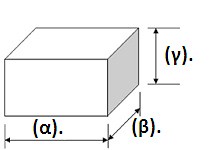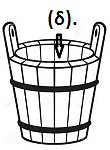

In the pictures of a solid object and of a bucket displayed above α is longer than β.
Am I correct in understanding that the letters corresponding to the dimensions are:
- α - πλάτος
- β - μῆκος
- γ - ὕψος
- δ - βάθος
- the relative positions of α and β, which I describe as πλάτος and μῆκος relative to me the observer - the one that runs length-way in front of me is πλάτος "width" while the one that runs length-ways away from me is μῆκος "length" because it gets more distant from me as I measure it - external observer-referentiality of proportions (in the way that γ and δ are measured relative to a datum - perhaps the surface that something is sitting on such as a table or the ground for γ, or relative to the surface of the water for δ), OR
- is it dependent on the relative proportions of α and β, where in this case the longer side of the object is designated by α, and if the object were oriented 90 degrees to the left or right, the longer side would still be πλάτος - such as when we walk around a vehicle or some sort of water-craft, we can speak of it's length and width no matter where we are relative to it - internal (self-)referentiality of dimensions.